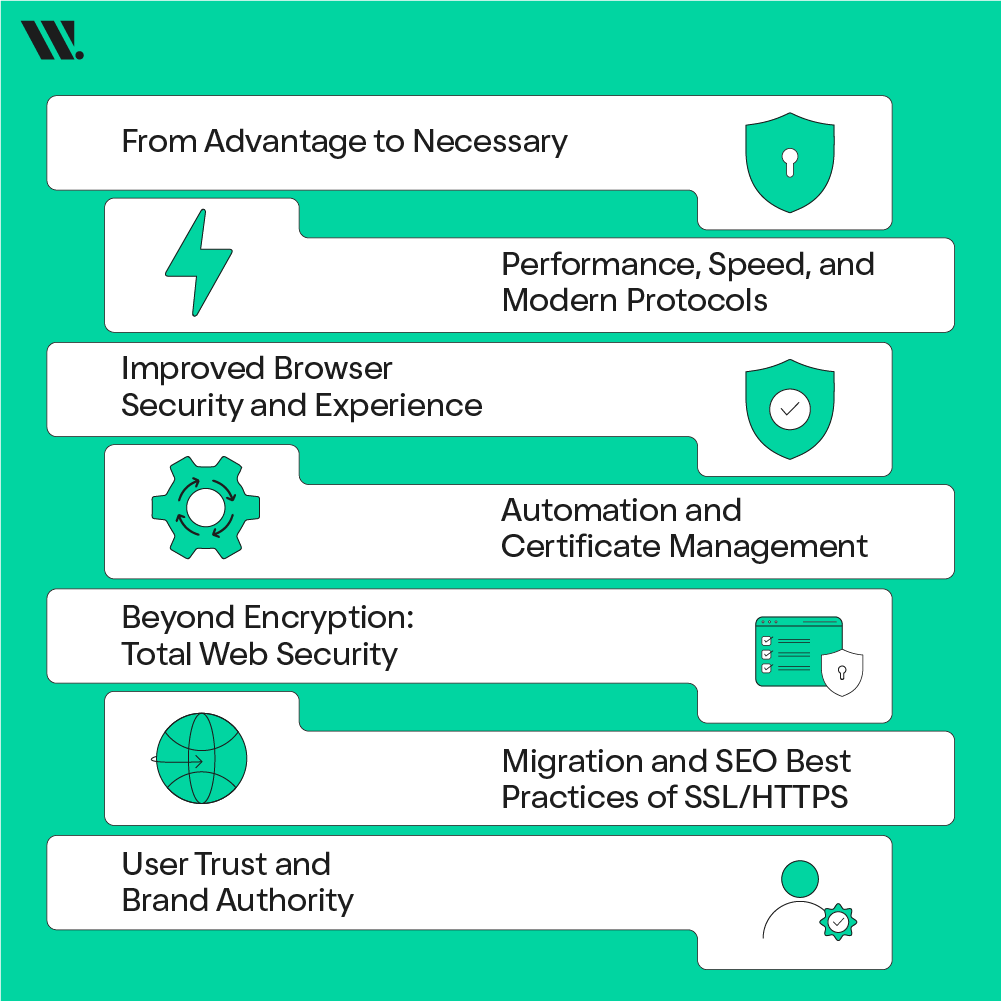Ever wondered why some sites show up on search result pages than the others? Or why some webpages have a secure connection and others do not? The answer is simple - SSL.
SSL certificates to seal data transfer between two communicating parties, it prevents unauthorized access during data exchange, and helps you keep decent rankings on Google.
In this post we will discuss the significance of SSL for SEO and how HTTPS can help boost your website’s ranking.
What is an SSL Certificate?
An SSL (Secure Sockets Layer) certificate is a digital certificate that confirms a website's security and creates an encrypted connection between the user's browser and the web server.
SSL certificates are installed by businesses and organizations to safeguard personal and sensitive information, demonstrating trust to customers.
SSL was replaced by TLS for improved security, though the name SSL is still commonly used.
Websites equipped with an SSL certificate tend to have a higher ranking on search engines like Google when compared to those without it, assuming all other factors are equal. SSL certificates can enhance a website's ranking in various ways:
Enhanced user experience to Get Better on SEO Ranking
Providing a great experience to your users is a very important factor in the success of your SEO efforts.
Websites with better user experiences are more likely to rank higher with search engines. SSL certificates are definitely part of that better user experience as it provides secure, private and trusted browsing.
For websites that are not secure, browsers show a warning, and visitors leave immediately. If you don’t have an SSL certificate, Google will now make it clear your website is “not secure”.
Google Chrome also warns users when not to enter their personal or financial information on unencrypted sites, degrading the user journey.
So, by having SSL certificates installed, you can ensure your customers aren’t encountering these warning pages when they visit your site, providing a positive user experience and increasing web traffic.
Higher Google Rankings due to SSL Certificate Protection
For Google security is high on the priority list when it comes to ranking a website. An SSL certificate can give you an edge over the non-https sites with all of the other SEO factors being equal in Pakistan.
But it’s difficult to measure how much an SSL certificate directly affects rankings in search algorithms as there are many other ranking factors.
An example can be a website without an SSL certificate but with hundreds of backlinks even ranking higher than one with an SSL certificate and no backlinks.
It should be noted that buying a low-cost SSL certificate does not mean the website rank will automatically get better. But pairing an SSL certificate with quality content, great site navigation, and a fast load time can also help boost SEO rankings. Thus, even a website using SSL could overtake one that does not.
Faster Loading for Websites with SSL Certificates
Loading speed of a website is an important factor which enhances user experience and also contributes to SEO ranking.
As there are no ‘Go Back’ and ‘Proceed Anyway’ buttons on HTTPS websites, sites that use it load faster. Quick load time: Google favors speedy sites. Installing an SSL certificate on a website enhances user's experience and SEO ranking by displaying HTTPS in the URL of the browser.
Mobile Friends -Pages need to be AMP
Mobile-friendly sites have an improved ranking in search engines, such as Google. To be able to build AMP, you need an SSL certificate and, therefore, also a mobile-friendly site on all fronts, a good way to increase your SEO ranking.
With an easy availability of data, the number of mobile internet users is on the rise. A statistical study shows that over 55% of all web traffic is via mobile, in Asia it’s even higher than in the Western world, nearly the same as in Africa. This trend is likely to further increase in the near future.
SSL SEO 2025: Why it is Important

In 2025, SSL (Secure Sockets Layer) isn’t even a ranking factor; it’s an SEO staple. Particularly, Google and other leading search engines have refined their algorithms to consider website security as an important trust and ranking factor. And Google might ask for final retribution, such as penalties or reduced visibility or even deindexation from search results.
SSL Certificates have become a must for securing the communication between the server and users, protecting data from threats and increasing the confidence of your users.
From Advantage to Necessary
In 2023, there was a small ranking boost for websites that were simply HTTPS. In 2025, that’s all flipped on its head; SSL is now a requirement for every domain. Search engines will automatically demote or remove sites which aren’t secure by not using HTTPS, particularly in sectors such as finance, health and eCommerce. This means SSL is not an option any more; it’s a must for search visibility and trust.
Performance, Speed, and Modern Protocols
And while it was once assumed earlier iterations of SSL crippled websites, modern protocols like HTTP/2, HTTP/3 and TLS 1.3 have made secure sites faster to load and more efficient to operate. In 2025, Google will incentivise websites that harden their TLS configuration and use OCSP stapling to keep certificate renewals a zero-downtime. These contribute to the improvement of both page speed and Core Web Vitals, some key SEO performance metrics.
Improved Browser Security and Experience
Browsers like Chrome, Firefox and Safari now deliver more than just a simple “Not Secure” warning. They outright refuse mixed content (HTTP images, scripts and CSS on HTTPS pages), labeling them as insecure subresources. A fully secure-by-default experience is essential for building trust and reducing bounce rates, which are SEO factors.
Automation and Certificate Management
By 2025: Smarter, automated management of SSL certificates. Automation via Let’s Encrypt and the ACME protocol have made renewal of certificates with no downtime a breeze. Companies that automate their SSL management enjoy a reduced number of expired certificate errors, ensuring clients have 100% uptime and better support for SEO.
Beyond Encryption: Total Web Security
Search engines now prioritise security policies that are broad, not merely an HTTPS-encrypted connection. This includes:
- HSTS (HTTP Strict Transport Security)
- CSP (Content Security Policy)
- Secure cookies and DNSSEC
These are countermeasures against injection attacks, content hijacking, and SEO spam to maintain security and performance cleanliness.
Migration and SEO Best Practices of SSL/HTTPS
Transition from HTTP to HTTPS now requires special SEO concern. Websites must:
- Develop 301 Redirects to properly redirect every URL
- Update canonical tags
- Verify backlink updates
There should be security on all APIs and subdomains (such as analytics endpoints)
A perfectly seamless migration to ensure no traffic or ranking loss, and retain referral integrity in analytics.
User Trust and Brand Authority
Today’s customers are more privacy-aware than ever before. Trust signals that users see — such as HTTPS, CT logs, or a secure certificate add even more credibility to the user experience. In 2025, secure branding is a better SEO, as Google synchronises the parameters of security and trust with the user’s experience philosophy.
The Importance of SSL in SEO: 2023 vs 2025
| Aspect | 2023 View | 2025 Update |
|---|---|---|
| Ranking Signal | HTTPS gives a small ranking boost. | HTTPS is mandatory; non-secure sites are penalized. |
| Performance | SSL slightly improves speed. | HTTP/2, HTTP/3, TLS 1.3 ensure faster, optimized performance. |
| Browser Warnings | Chrome marks non-HTTPS as “Not Secure.” | Browsers block mixed content and insecure subresources. |
| Certificate Management | Manual installation and renewals. | Automated via Let’s Encrypt, ACME, zero downtime. |
| Security Scope | Focus on SSL encryption only. | Includes HSTS, CSP, DNSSEC, and secure cookies. |
| Protocols | HTTP/2, HTTP/3 not discussed. | Modern protocols required for SEO performance. |
| Migration Strategy | Basic SSL setup guidance. | Includes redirects, canonicals, backlinks, and analytics updates. |
| User Trust | Padlock symbol boosts trust. | Focus on transparency, CT logs, and data privacy. |
How Can You Get an SSL Certificate?
Acquiring an SSL certificate is easy to follow since there are many providers out there who display the cost of their services on the internet.
Depending on the type of SSL i.e Comodo Positive SSL, Comodo Essential SSL, Positive SSL Multi-Domain, Positive SSL Wildcard or even Comodo EV SSL that's preferred one should upload relevant documents.
Once the documents are verified, you will be issued a certificate detailing the important details like domain name, type of certificate, and issuing authority.
Installation instructions for an SSL certificate are also generally included with the one you purchase for your website.
Conclusion
SSL Certificates are a critical part of website security by encrypting information sent between web server and browsers. Furthermore, SSL can also improve the user experience by increasing page load times.
Better yet, SSL certificates are an asset you will benefit from in enhancing your SEO; hence it is a key part of driving traffic to your website.
If you haven’t installed an SSL certificate yet, you’re already falling behind your competitors. Secure your website and build trust today — it’s the perfect time to buy an SSL certificate from WebSouls.






